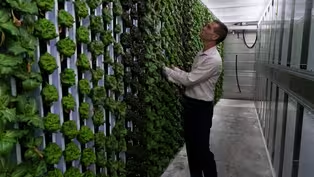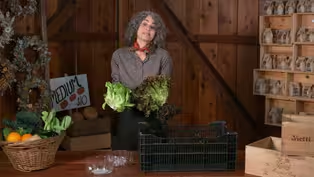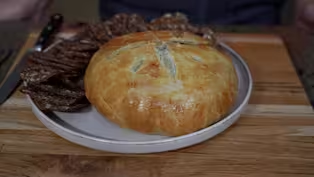
San Miguel Produce
Clip: 8/23/2024 | 5m 21sVideo has Closed Captions
A farm family meets the increasing consumer demand for washed and bagged salads.
Meet these fourth-generation, Southern California farmers who are meeting the increased demand for washed and bagged salads.
Problems playing video? | Closed Captioning Feedback
Problems playing video? | Closed Captioning Feedback
America's Heartland is presented by your local public television station.
Funding for America’s Heartland is provided by US Soy, Sustainable Agriculture Research and Education, Rural Development Partners, and a Specialty Crop Grant from the California Department of Food and Agriculture.

San Miguel Produce
Clip: 8/23/2024 | 5m 21sVideo has Closed Captions
Meet these fourth-generation, Southern California farmers who are meeting the increased demand for washed and bagged salads.
Problems playing video? | Closed Captioning Feedback
How to Watch America's Heartland
America's Heartland is available to stream on pbs.org and the free PBS App, available on iPhone, Apple TV, Android TV, Android smartphones, Amazon Fire TV, Amazon Fire Tablet, Roku, Samsung Smart TV, and Vizio.
Providing Support for PBS.org
Learn Moreabout PBS online sponsorship(relaxing upbeat music) - [Narrator] It may surprise you to learn that the average American eats four or more salads a week, and who leads the nation in growing the greens that end up in your salad bowl?
- California is about 80% of all leafy greens for the entire country.
It's significant.
Leafy greens are... We have the perfect climate, weather, soil, for the ability to grow regionally year round and provide an abundance of leafy greens for our country.
- [Narrator] Jan Berk is the chief operations officer for San Miguel Produce in Ventura County.
This farming operation grows a wide variety of washed, bagged, and ready-to-use greens.
Jan came to agriculture after a career in newspapers, joining her husband, Roy Nishimori, who founded San Miguel Produce in the 1970s.
- [Garrett] In 1995, we started Coming Clean Greens.
It's the original fresh-cut cooking greens.
- [Narrator] Garrett Nishimori is Jan and Roy's nephew and a fourth-generation member of this Japanese American farming family.
He oversees the San Miguel operation as general manager.
Garrett came to farming after training as a chef.
His background was beneficial, as San Miguel began a transition in the mid '90s from commodity crops like celery and broccoli to ready-to-use washed and bagged greens for salads and cooking.
- We developed some kits.
We developed different blends, and that's kind of where I guess my culinary background kind of comes in, and it kind of helps, you know, develop the type of flavors and stuff like that.
- [Narrator] Garrett's work in getting the greens from field to market keeps alive a family tradition dating back more than a century.
- So my great-grandfather immigrated here to California to the Los Angeles area in 1905 from Japan, and they started farming in that area.
- [Narrator] The Nishimori family had farmed in Japan, bringing their skills to America at the turn of the 20th century.
They were not alone.
At that time, more than 50% of Japanese Americans working on the West Coast were involved in agriculture.
World War II changed everything.
Thousands of Japanese American farms were lost to the government, and the Nishimoris, like thousands of others, were sent to internment camps.
Farmers lost millions of dollars when their properties were seized, only a fraction of which was repaid in reparations.
California is still home to a number of Japanese American-owned farms but dramatically fewer than generations back.
- In the 1950s, in 1956, my grandfather moved the family up to Oxnard and just started growing more vegetables up here.
And then in 1976 is when Roy, who's the owner of San Miguel produce, he started growing vegetables in this region.
- [Narrator] Workers in the San Miguel fields will handpick and harvest the farm's specialty crops year round.
The success of their ready-to-use bagged greens prompted an expansion of their production facilities in 2019.
And as with many businesses, opportunities to reach new ethnic and cultural markets have prompted product development.
- [Garrett] We have a brand called Jade Asian Greens, and we do baby Shanghai bok choy.
And we're looking to expand that into other of the Asian vegetables and try to bring that more mainstream.
And you might see more bok choy in stores and menus and meal kits and stuff like that.
- [Narrator] That consumer awareness has also brought with it continued and greater attention to detail in making sure that food products go from field to table with food safety considerations in mind.
- How do we improve food safety to ensure that we're providing the safest possible food for consumers?
We feed our family these same greens, and so, you know, we take that very seriously.
- [Narrator] Ready-to-use greens for salads and cooking continue to play a major role in America's consumer produce picture.
And Jan and Garrett say their agricultural efforts give them a chance to impact healthy food choices.
- I think the most exciting thing is that we get to promote fresh produce which is good for you.
You know, it's not processed food.
You know, almost everything that we promote as an industry has some sort of health benefit.
And I think that's exciting 'cause we're helping improve public health in America by promoting these products.
- [Narrator] Jan Berk says San Miguel Produce continues the Nishimori family's farming legacy, but she adds that everyone associated with the work here can take credit for its success.
- So I think that the success of the company is attributed to the people that we have here.
And we've built a great crew of people that have come along for the ride, and they do a great job, and I'm very proud of them.
And some of them are family members, and some of them aren't true blood family, but they feel like family.
Video has Closed Captions
Clip: 8/23/2024 | 5m 21s | A school district grows hydroponic lettuce for its students inside a converted shipping container. (5m 21s)
Hydroponic Farming - Harvesting Health
Video has Closed Captions
Clip: 8/23/2024 | 5m 24s | Our health expert explores the nutritional differences between hydroponic and conventional farming. (5m 24s)
Mushroom Brie - Farm to Fork by Sharon Profis
Video has Closed Captions
Clip: 8/23/2024 | 5m 22s | Learn how to make a mushroom brie wrapped in a puffed pastry. (5m 22s)
Providing Support for PBS.org
Learn Moreabout PBS online sponsorship

- Food
Christopher Kimball’s Milk Street Television
Transform home cooking with the editors of Christopher Kimball’s Milk Street Magazine.












Support for PBS provided by:
America's Heartland is presented by your local public television station.
Funding for America’s Heartland is provided by US Soy, Sustainable Agriculture Research and Education, Rural Development Partners, and a Specialty Crop Grant from the California Department of Food and Agriculture.



